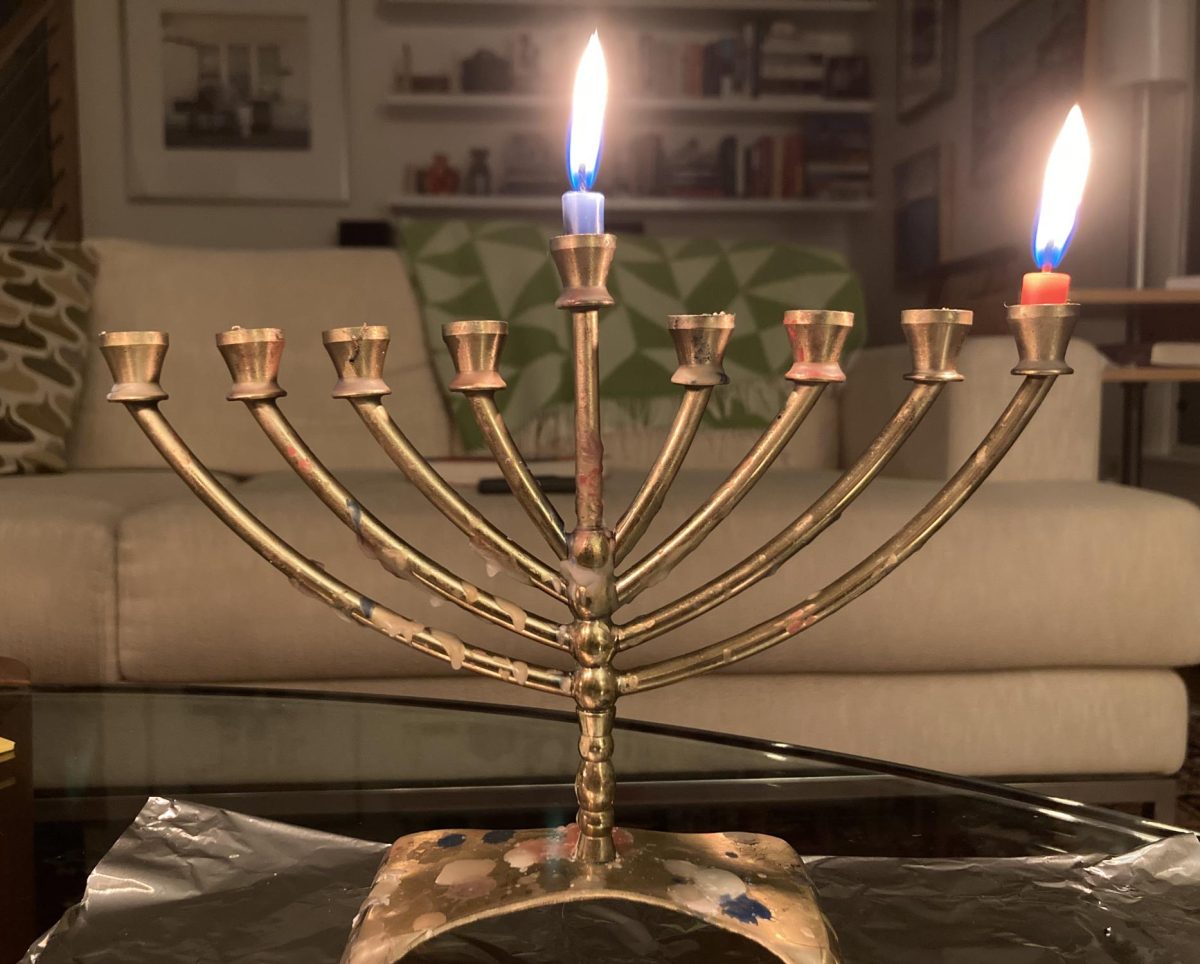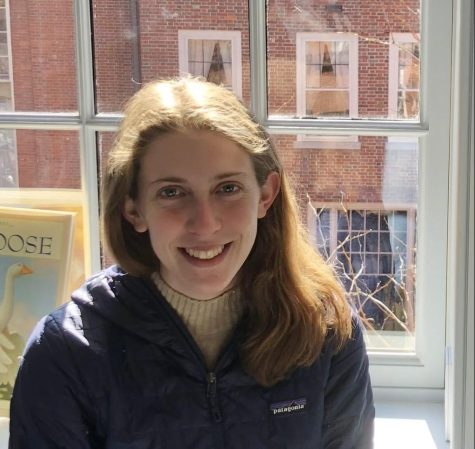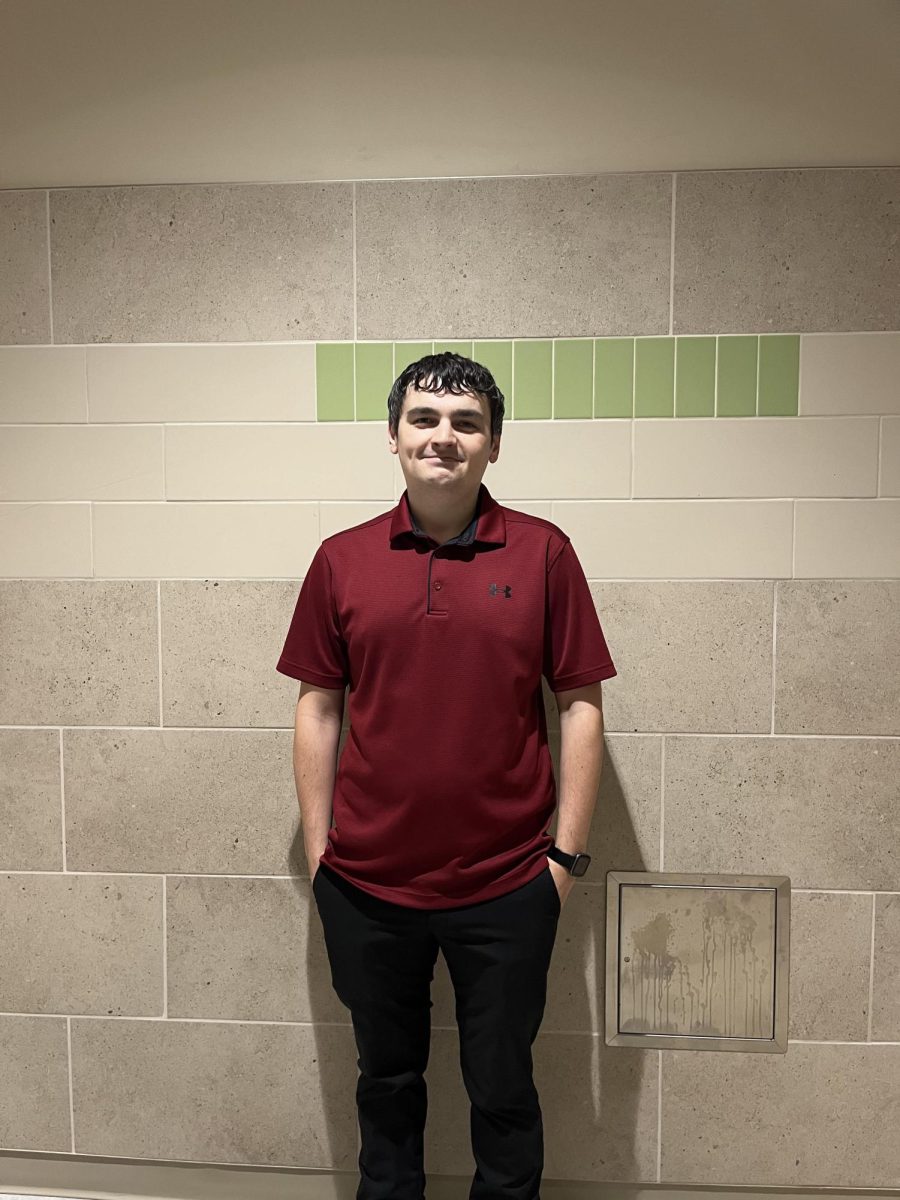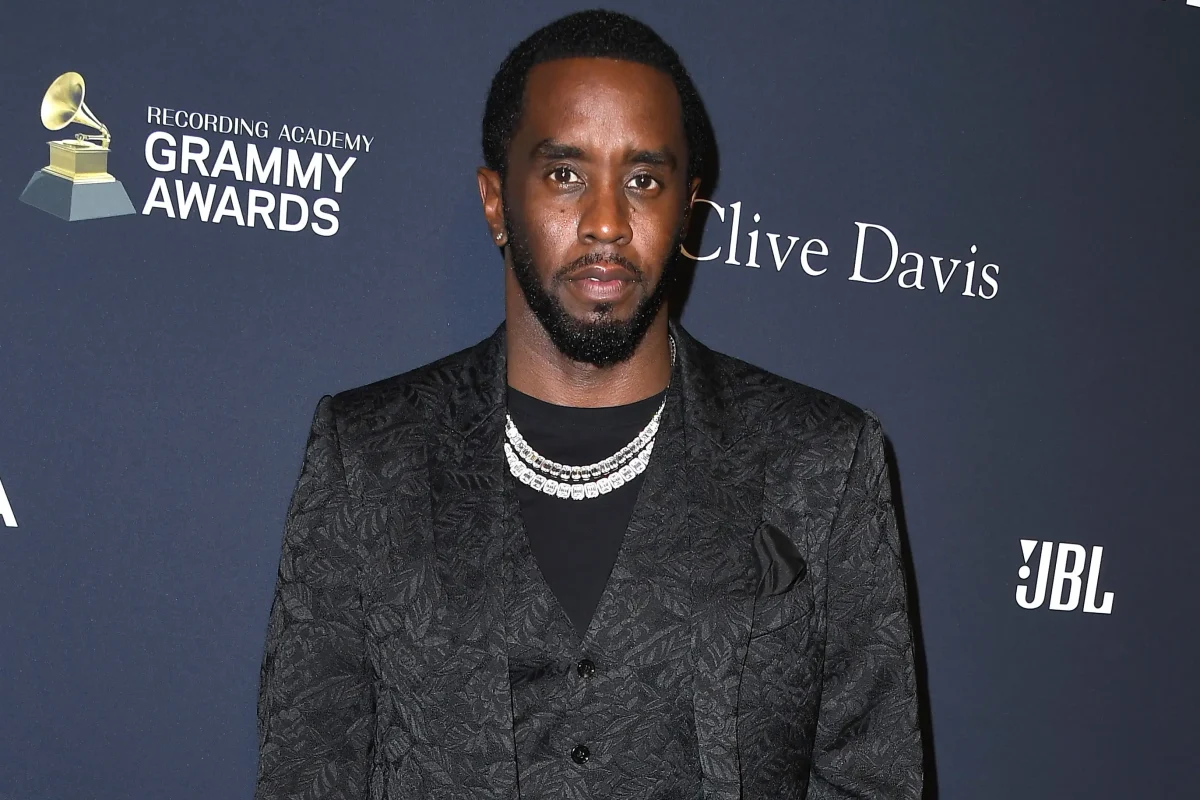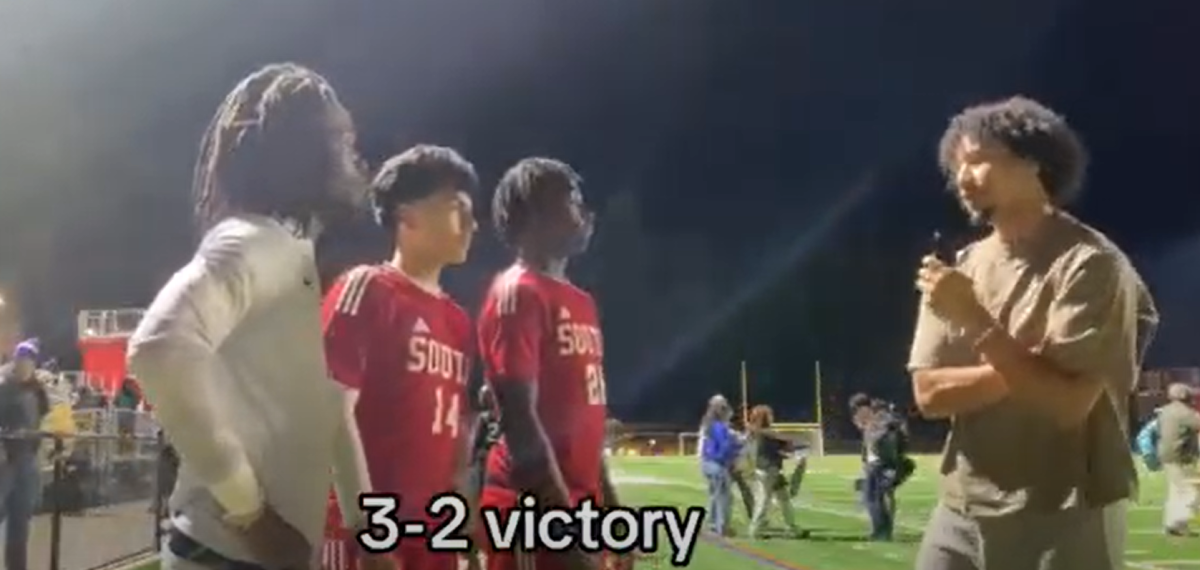In December, holiday lights adorn many houses and stores. People buy Christmas trees, listen to Christmas music, and wish each other “Merry Christmas.”
But for some, Christmas isn’t the defining feature of the season, including for Jews. Though some Jews celebrate Christmas secularly—whether because of family traditions or simply because they enjoy it—others don’t feel a connection to the holiday.
There is a Jewish holiday around this time of year, though: Chanukah (ḤA-nuh-kah), which began in the evening of Thursday, December 7, and will last for eight days. Though it is often mistaken for “Jewish Christmas,” Chanukah is a relatively minor holiday, marked by lighting candles, seeing family, and eating traditional foods. It is not as important as holidays like Passover, Rosh Hashanah, and Yom Kippur. However, Jews still make meaning of Chanukah in many different ways.
The Chanukah Story
The celebration of Chanukah is based on a story. When Jews in ancient Israel were under Greek rule, they were barred from observing Judaism, and the Temple, a holy place, was desecrated. So, the Jews rebelled, in order to gain their freedom.
Eventually, they succeeded, and they decided to restore the Temple to its proper state. In the Temple, there was a menorah—a candelabra with seven arms, for the days of the week. The Jews barely had any oil to light the menorah, but they tried anyway. The oil only should have lasted for one night, but it lasted for eight. Hence, Chanukah is eight days long.
Chanukah Traditions
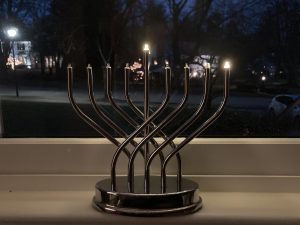
On Chanukah, Jews light a chanukiah (ḥa-nu-KI-ah), a candelabra that is similar to a menorah, but is designed for the eight days of Chanukah. Every night, Jews add one more candle to represent another night.
Robotics teacher Mr. Jones lights the chanukiah every night and says prayers for the candles. “And sometimes I’ll even FaceTime my mom and do it with her,” he said, “because it’s a really nice family moment that I miss.”
Psychology teacher Ms. Weinsaft doesn’t always light the candles on Chanukah—December is a busy time, and sometimes it gets lost in the shuffle. As she’s gotten older, too, she feels less of a connection to Chanukah.
However, her partner, who is not Jewish, has recently enjoyed lighting the candles with her. “He just loves lighting the candles every night,” she said. “So that’s a thing we do now.”
As Ms. Weinsaft and Mr. Jones showed, Chanukah is typically celebrated with loved ones.
Mr. Jones would go with his family to regular Shabbat services on the Friday night of Chanukah. At synagogue, the whole community would light the chanukiah together. Then, he would go to his aunt’s house for a celebration. “We would cook and eat latkes,” he said, “and it was great. . . I miss that.”
Latkes (potato pancakes) are a traditional Chanukah food. Many traditional Chanukah food, like latkes, are fried in oil, to commemorate the miracle of the oil in the Great Temple. Other traditional Chanukah foods include sufganiyot (jelly doughnuts) and gelt (chocolate coins); gelt is typically given to kids.
“I love potato latkes,” said Spanish teacher Ms. DeHaan. She only has them on Chanukah, when she or her mom makes them, which makes them a special part of celebrating. She likes being with her family, including her siblings and their families.
In addition to seeing family, some Jewish families exchange gifts.
“We did give some gifts [when I was younger],” Mr. Jones said, “but small stuff. We didn’t do very much.”
In terms of Jewish holidays, Chanukah isn’t very important, said Ms. DeHaan, but it’s fun to be with family, and kids always enjoy getting presents. However, most Jews attribute giving gifts on Chanukah to the presence of Christmas gift-giving in non-Jewish America.
The Complicated Holiday Season
Overall, many Jews feel that Christmas dominates the holiday season, which makes sense, because Christmas is a more important holiday to Christians than Chanukah is to Jews. Every Jewish family has a different relationship to Christmas, with regards to how they do or do not commemorate it.
None of Ms. Weinsaft’s immediate family was Christian, so she didn’t celebrate Christmas growing up. On the contrary, when she was in daycare, she remembers the staff calling home, because she had the Santa Claus conversation “too early” with some other kids.
She laughed. “[I thought], ‘I’m definitely the most well-behaved kid at the daycare, so you’re going to tell me that he’s going to skip my house?’” she said. “‘It doesn’t make any sense.’”
During the holiday season, her Christian friends include her in their Christmas celebrations, and “it’s very sweet,” she said. But she herself doesn’t relate to the holiday.
For Ms. DeHaan, Christmas has recently become a bigger part of her life. When she was younger, she would sometimes go to a friend’s house to do Christmas decorations—and her friends would come to her house to make latkes or play dreidel, a traditional Chanukah game with a spinning top. “It was more like a cultural exchange,” she said.
As Ms. DeHaan grew up, her engagement with Christmas varied year to year. Some years, “I’m like, ‘no one cares about my holiday.’” Other years, she said, she’s fine with it. “I like the smell of Christmas trees just as much as the next person,” she laughed.
Now, though, “I’m about to marry a non-Jew,” she said. As Christmas becomes part of her holiday tradition, she is still getting used to it. She used to explain to students that she didn’t celebrate Christmas, but now she thinks, “‘Oh wait, now I do celebrate Christmas. And that’s an adjustment.’” She enjoys learning about how different families celebrate Christmas, though, just as she likes when people learn about Jewish traditions.
Mr. Jones grew up celebrating Christmas and Chanukah, because his dad isn’t Jewish. Though Mr. Jones was raised Jewish, he and his family would go with his dad to church on Christmas. “It’s a tradition that I love so much,” he said, “even though I don’t connect to it religiously.”
His family had a Christmas tree growing up—and he still has one. He puts a Star of David at the top. “The tree doesn’t mean much about religion,” he explained. “It’s just tradition for me, and I have all these ornaments that I love.”
Mr. Jones enjoyed growing up in an interfaith family, and found it powerful to see traditions from different places and religions. Still, “you’re kind of all by yourself,” he said. Though he identifies squarely as Jewish, the Christian half of his family is important to him. Growing up in a family like his, “[it just feels like] there aren’t a ton of people with the same experiences as you,” he said.
The Importance of Chanukah
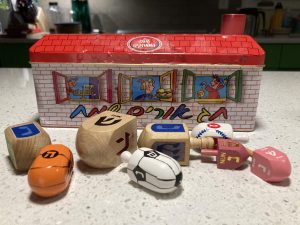
Despite the complexities of the holiday season, all three teachers find meaning in celebrating Chanukah—whatever form that takes. Ms. Weinsaft likes to connect the holiday to its founding story, taking it as a reminder to “look for miracles” in everyday life, even when they don’t seem like miracles.
For Ms. DeHaan, Chanukah represents “my own traditions that are rooted in my religion and my culture.” This identification is powerful for her, especially amidst the larger holiday season. And it provides an opportunity to see family and light the candles all together.
Mr. Jones loves lighting the chanukiah, especially on the seventh and eighth nights, when it is almost full with candles. Then, he fully appreciates why Chanukah is the Festival of Lights.
“It makes you warm inside. . . [and] like you’re part of something bigger,” he said. “It is the most beautiful sight.”

